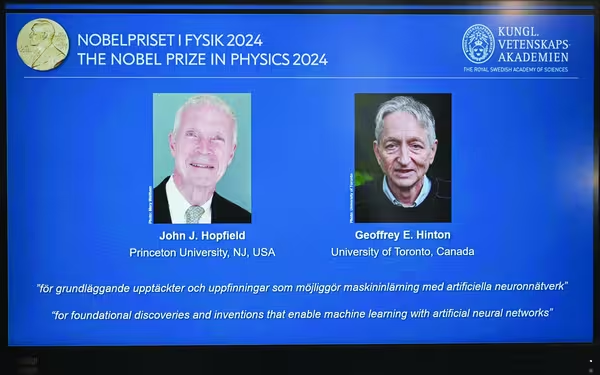Saturday, November 16, 2024 05:40 PM
Hinton and Hopfield Win Nobel Prize for AI Breakthroughs
- Hinton and Hopfield awarded Nobel Prize in Physics.
- Their research laid groundwork for modern AI.
- AI advancements raise ethical and societal questions.
 Image Credits: tribune.com.pk
Image Credits: tribune.com.pkGeoffrey Hinton and John Hopfield awarded Nobel Prize for foundational AI breakthroughs, raising important ethical and societal questions.
On Tuesday, the world of science celebrated a significant milestone as Geoffrey Hinton, often referred to as the "Godfather of AI," and physicist John Hopfield were awarded the prestigious Nobel Prize in Physics. Their groundbreaking research in the 1980s laid the essential groundwork for artificial intelligence (AI), particularly through the development of neural networks. This technology has not only transformed various industries but has also sparked intense discussions about its potential impact on society.
Geoffrey Hinton and John Hopfield's work in the realm of neural networks has been pivotal. Neural networks are systems that mimic the way human brains operate, allowing computers to learn from data and make decisions. This technology has become the backbone of many AI applications we see today, from voice recognition systems to self-driving cars. The duo's contributions have opened doors to innovations that were once thought to be the stuff of science fiction.
However, with great power comes great responsibility. As AI continues to evolve, it raises important questions about ethics, privacy, and the future of work. While the advancements promise to enhance our lives, they also bring about fears of job displacement and the potential misuse of technology. The discussions surrounding AI are not just technical; they touch on the very fabric of our society.
The recognition of Hinton and Hopfield with the Nobel Prize is not just a celebration of their past achievements but also a call to action for the future. As we stand on the brink of an AI-driven era, it is crucial for society to engage in thoughtful dialogue about the implications of these technologies. The journey of AI is just beginning, and it is up to all of us to ensure that it leads to a brighter, more equitable future for everyone.













